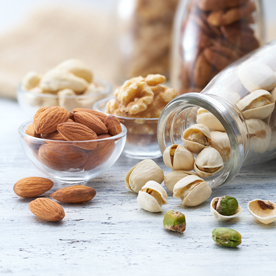
PCOS is a complicated hormonal condition that affects many women in the UK. Women with PCOS often experience troublesome symptoms, including excess hair growth or hirsutism, hair loss, acne, weight gain, and irregular periods.
Now, the scientific community is starting to recognise the condition extends far beyond the physical, shedding light on the link between PCOS and mental health challenges (1).
Navigating a mental health condition alongside PCOS can be tremendously difficult. Fortunately, there’s plenty of help available in the way of lifestyle and dietary interventions, as well as professional support, for those diagnosed with PCOS.
What’s the link between PCOS and mental health?
According to a recent study, women with PCOS are more likely to be diagnosed with a mental health condition (2). While more research is needed to assess exactly why and how PCOS affects emotional health, several factors may contribute to it.
 PCOS is first and foremost a hormonal disorder characterised by hormone imbalances. Women with PCOS often have insulin resistance and elevated levels of androgens (‘male’ hormones), which in itself may increase the risk of various mental health challenges (3).
PCOS is first and foremost a hormonal disorder characterised by hormone imbalances. Women with PCOS often have insulin resistance and elevated levels of androgens (‘male’ hormones), which in itself may increase the risk of various mental health challenges (3).
The physical symptoms of the condition also play a role. Many women with PCOS feel a lack of control over their health and bodies, often negatively impacting their emotional health (4).
PCOS can cause excess facial and body hair, as well as hair loss that resembles male-pattern balding. It can make it difficult to lose weight, too. These distressing effects of PCOS can result in self-esteem issues and mental health challenges, particularly when society still has such a one-dimensional perception of ‘feminine’ norms.
Aside from this, women with PCOS can have irregular periods and trouble conceiving, which can lead to anxiety, depression, and feelings of hopelessness. A 2014 study found irregular menstrual cycles in women with PCOS were strongly associated with psychiatric problems (5).
PCOS mood swings
Women with PCOS might not experience the ‘traditional’ mood swings associated with a regular monthly cycle, known as premenstrual syndrome (PMS). However, this doesn’t mean they’re immune to mood changes.
The imbalance of hormones and physical effects of PCOS can still lead to general feelings of instability and bouts of anxiety and depression.
PCOS and anxiety
PCOS has been described as the ‘thief of womanhood’ (6). Many women feel ostracised and stigmatised because of their physical symptoms, with some reporting feeling ‘abnormal’ and not ‘proper’ women in a society that celebrates thin, hairless bodies (7).
All of this puts women with PCOS at a greater risk of experiencing social anxiety, generalised anxiety, panic attacks, confidence issues, and low self-esteem (8).
Another challenging aspect of PCOS can be infertility, often resulting from menstrual irregularities. Women with PCOS commonly face anticipatory anxiety about whether they can have children and build a family (9).
Equally, women may become anxious over managing their weight, which can increase due to the hormonal changes associated with PCOS. In some cases, this may lead to disordered eating, a complicated condition underpinned by anxiety.
The diagnosis itself can also come with a lot of anxiety. Especially coming to terms with the fact that there is no cure for PCOS, only management techniques to support symptoms.
PCOS and depression
Like anxiety, PCOS can also lead to depression. The physical symptoms of PCOS can lead to hopelessness and despair, which can pave the way for depression.
Moreover, PCOS is characterised by insulin resistance. And studies suggest greater insulin resistance increases the risk of depression (10).
How to tell if you’re down
We all feel down from time to time. But feeling consistently ‘off’ is different. If you think PCOS has triggered depression, you may want to ask yourself the following.
-
During the last month, have you often been bothered by feeling down, depressed or hopeless?
-
During the last month, have you often been bothered by having little interest or pleasure in doing things?
PCOS and stress
PCOS-induced anxiety can often go hand-in-hand with chronic stress. This ‘invisible’ symptom can manifest as sleep disturbances, over or undereating, fatigue, loss of enthusiasm, irritability and nervousnss. It can also present in physical symptoms such as headaches, muscle tension and high blood pressure.(19)
PCOS and confidence
Dealing with the everday challenges of PCOS can take a toll on your self-esteem and cause low confidence levels. You can find more information about getting your confidence back after a PCOS diagnosis and other tools to help overcome low self-esteem here.
How to deal with negative emotions
Navigating PCOS and mental health challenges can be difficult. But there are many ways to deal with negative emotions and support your overall wellbeing.
Diet for PCOS and mental health
Food doesn’t just affect our physical body; it affects our mental and emotional wellbeing, too. Committing to making healthy dietary choices every day will have a cumulative effect on your mental health. In time, you’ll be amazed at the positive impact on your mind and body.
Improve gut health
The gut and the brain have a bidirectional relationship through the gut-brain axis: the gut signals to the brain; and the brain signals to the gut. That’s why the gut is often called the ‘second brain’. So, looking after your gut also means looking after your brain.
Eat more plants
Eating 30 different plant foods every week is one of the best ways to support your gut health. These foods are rich in polyphenols and fibre, which feed your gut microbes.
The Smiles Trial (2017) was one of the most pioneering studies in the nutrition and mental health space, highlighted the extent to which plant foods can improve mood (11).
Researchers recruited participants with major clinical depression and randomly assigned them to nutritional support or social support for 12 weeks. The nutritional support group were given a predominantly plant-based diet – foods known to feed the gut – while the other group received therapeutic support.
Amazingly, more than 30 per cent of those in the nutritional support group entered remission – meaning they weren’t depressed anymore – compared to 8 per cent of those in the social support group.
Plant foods include fruit, vegetables, nuts, seeds, whole grains, legumes, and beans, so try to incorporate more of them into your diet.
Add fermented foods
Fermented foods may also the microbial diversity of your gut bacteria, which is a marker of good gut health (12). Natural yoghurt, kefir, kombucha, pickles, sauerkraut, miso, tempeh, and kimchi are great examples of fermented food for your gut.
Gut-friendly supplements
You may also wish to add high-strength live cultures and a natural soluble fibre called Fructo-Oligosaccharides (FOS) to your diet to support your gut health.
Manage blood sugar levels
Aside from short-term shakiness, lack of focus, and brain fog, chronically imbalanced blood sugar levels can have a long-term effect on your emotional health. Poor blood sugar management closely mirrors mental health symptoms, like irritability and anxiety, so smoothing any spikes will result in better overall wellbeing.
Rethink your sugar intake
The body breaks sugars down very easily, causing an almost immediate spike in blood sugar. Studies show that excessive sugar consumption is associated with developing insulin resistance, which isn’t great if you already have PCOS (13).
Choose complex carbohydrates
Healthy, complex carbs, like whole grains (quinoa, buckwheat, and whole-wheat pasta), fibre-rich veggies (carrots, leafy greens and cauliflower), fibre-rich fruit (berries and apples), and beans are much better for your blood sugar because they contain fibre, which helps to slow down the spike in glucose.
Take a wall after eating
Evidence suggests glucose levels peak within 90 minutes after a meal (14). If you can – and it’s possible – consider doing some movement straight after your meal, so your body can quickly use the glucose, which may help flatten your blood sugar levels.
Be careful with caffeine and alcohol
Both caffeine and alcohol can be triggers for people with anxiety and depression, so it might be an idea to reduce your intake for the time being.
Natural support for PCOS and mental health
In addition to eating more good-mood foods, you may wish to add the following supplements to your diet for targeted support.
Magnesium
Somewhat of a wonder mineral, magnesium contributes to normal psychological function, making it an especially helpful addition for emotional wellbeing.
5 HTP
5 hydroxytryptophan, or 5 HTP, is the natural compound manufactured from the amino acid, tryptophan. The brain converts 5 HTP into serotonin, our ‘feel-good’ neurotransmitter known to affect mood.
Ashwagandha
Ashwagandha is a revered herb of the Indian Ayurvedic system of medicine. Adaptogens, like ashwagandha, help the body manage stress.
St John’s Wort
A perennial plant with yellow, star-shaped flowers, St John’s Wort is a traditional herbal remedy used for the relief of mild anxiety and slightly low mood.
Omega-3
Long-chain omega-3 fatty acids, DHA and EPA, support brain function, so you may want to take a high-strength fish oil supplement or vegan alternative to buffer your reserves.
Vitamin D3
Vitamin D3 operates more as a multifunctional hormone than a vitamin. It’s thought to support many areas of health, including mood.
Lifestyle changes to support your mental health and PCOS
Lasting change doesn’t happen overnight. Like diet, simple tweaks to your lifestyle can support your mental health journey with PCOS.
Meditation and mindfulness
Mindfulness is increasingly used to improve mental health, with many people turning to it to manage their emotional wellbeing.
Regular mindfulness practice down-regulates the nervous system, encouraging rest and restoration. One study reported that meditation programs may ease psychological symptoms of anxiety, depression, and pain related to stress (15).
You don’t need candles or incense to meditate. You can practice on the bus, walking the dog, or in bed before sleeping. Even a few minutes every day to let go, breathe, and recharge can go a long way to improve your mental health.
Take a look at our guide to mindfulness for more in-depth advice.
Try breathwork
Breathwork falls under the umbrella of mindfulness. Belly breathing – breathing from your diaphragm, not your chest, which anxious people, in particular, tend to do – activates the parasympathetic nervous system, responsible for your ‘rest and digest’ state. In other words, belly breathing can make you feel calmer.
Whenever you need a moment to release, breathe in through your nose for 4 – pushing your belly out – and breathe out for 6 – pulling your belly in. Repeat as many times as you want. Just one round of diaphragmatic breathing can instantly help you feel more relaxed.
Get enough sleep
Ensuring you get enough sleep every night is one of the best things you can do for your mental health.
Although this can be hard when you’re navigating a mental health challenge – poor sleep can worsen mental health, and poor mental health can worsen sleep – the payoff is enormous for your overall wellbeing.
Relaxing and unwind before bed to prep the body for a restful sleep. For example, you could meditate, soak in an Epsom salt bath, read by a soft lamp, or do some light stretches. This pre-bed ritual is unique to you; find what works.
Magnesium. Valerian root, and tart cherry juice are often recommended to support sleep, so you may wish to add these supplements to your diet. You can read more about supporting your sleep hygiene here.
Exercise
The physical and emotional benefits of exercise are well-documented in research. Movement releases feel-good neurotransmitters called endorphins in the brain, which can reduce anxiety, depression, and negative mood (16).
Mind-body exercises
Although all forms of exercise will supercharge your mood, mind-body activities, like yoga and tai chi, are particularly good for mental health. Studies suggest greater reductions in depression were associated with a higher frequency of yoga sessions per week (17).
Move outside
Equally, if it’s convenient and available, try exercising outside. Time spent in nature lowers stress, reduces anxiety and depression, and improves general wellbeing (18). Plus, it gives you ample opportunity to bask in natural sunlight, helping you synthesise vitamin D3, which is important for mood regulation.
Education
It can also help to learn everything you can about PCOS and how it affects your mind and body. Educating yourself may help you better understand how to manage the condition. Just knowing there are ways you can support yourself could make you feel more empowered.
Ask your healthcare team for as much information on the condition. You might even consider joining an online PCOS forum, such as Health Unlocked, Patient, NHS Choices, Fertility Friends and Soul Cysters, where you can keep in touch with others affected by the condition.
Ask for help
Sometimes, lifestyle changes and self-care practices aren’t enough. If persistent anxiety and low mood are interfering with your daily life, there’s no shame in seeking help.
You may wish to join a local PCOS group. The groups, run by PCOS charity Verity, have locations all over the country. And if there isn’t one nearby, you could even start your own.
If joining a community group doesn’t feel within your grasp right now, that’s also fine. Instead, you might want to keep a journal to record your thoughts first.
Of course, professional help is always an important and valid option. Having a chat with your GP or a therapist with specific expertise in managing PCOS is a great place to turn to.
Find out more
If you found this piece on PCOS and mental health useful, you can find similar guidance on our dedicated PCOS hub. Alternatively, please get in touch with our team of expert Nutrition Advisors, who are on hand to provide free, confidential advice.
References:
-
Brutocao C, Zaiem F, Alsawas M, Morrow AS, Murad MH, Javed A. (2018) Psychiatric disorders in women with polycystic ovary syndrome: a systematic review and meta-analysis. Endocrine.
-
Berni TR, Morgan CL, Berni ER, Rees DA. (2018) Polycystic Ovary Syndrome Is Associated With Adverse Mental Health and Neurodevelopmental Outcomes. J Clin Endocrinol Metab. 103(6):2116-2125.
-
Annagur BB, Tazegul A, Uguz F, Kerimoglu OS, Tekinarslan E, Celik C. (2013) Biological correlates of major depression and generalized anxiety disorder in women with polycystic ovary syndrome. J Psychosom Res. 74:244-7.
-
Psychiatric complications in women with polycystic ovary syndrome most often linked to menstrual irregularities (2019) Columbia School of Nursing. Available online: https://www.nursing.columbia.edu/news/psychiatric-complications-women-polycystic-ovary-syndrome-most-often-linked-menstrual
-
Snyder BS. (2006) The lived experience of women diagnosed with Polycystic Ovary Syndrome. J Obstet Gynecol Neonatal Nurs. 35(3):385-92.
-
Kitzinger C, Willmott J. (2002) 'The thief of womanhood': women's experience of polycystic ovarian syndrome. Soc Sci Med. 254(3):349-61.
-
Kitzinger C, Willmott J. (2002) 'The thief of womanhood': women's experience of polycystic ovarian syndrome. Soc Sci Med. 54(3):349-61.
-
Cooney LG, Lee I, Sammel MD, Dokras A. (2017) High prevalence of moderate and severe depressive and anxiety symptoms in polycystic ovary syndrome: a systematic review and meta-analysis. Hum Reprod. 32(5):1075-91.
-
Barry JA, Hardiman PJ, Saxby BK, Kuczmierczyk A. (2011) Testosterone and mood dysfunction in women with polycystic ovarian syndrome compared to subfertile controls. J Psychosom Obstet Gynaecol. 32(2):104-11.
-
Greenwood EA, Pasch LA, Cedars MI, Legro RS, Eisenberg E, Huddleston HG. (2018) Insulin resistance is associated with depression risk in polycystic ovary syndrome. Fertil Steril. 110(1):27-34.
-
Jacka, F.N., O’Neil, A., Opie, R. et al. (2017) A randomised controlled trial of dietary improvement for adults with major depression (the ‘SMILES’ trial). BMC Med 15, 23.
-
Marco ML, Sanders ME, Gänzle M, Arrieta MC, Cotter PD, De Vuyst L, Hill C, Holzapfel W, Lebeer S, Merenstein D, Reid G, Wolfe BE, Hutkins R. (2021) The International Scientific Association for Probiotics and Prebiotics (ISAPP) consensus statement on fermented foods. Nat Rev Gastroenterol Hepatol. 18(3):196-208.
-
Macdonald IA. (2016) A review of recent evidence relating to sugars, insulin resistance and diabetes. Eur J Nutr. 55(Suppl 2):17-23.
-
Erickson M, Jenkins N, McCully K. (2017) Exercise after You Eat: Hitting the Postprandial Glucose Target. Frontiers In Endocrinology. 8.
-
Goyal M, Singh S, Sibinga EMS, et al. (2014) Meditation Programs for Psychological Stress and Well-being: A Systematic Review and Meta-analysis. JAMA Intern Med. 174(3):357–368.
-
Sharma A, Madaan V, Petty FD. (2006) Exercise for mental health. Prim Care Companion J Clin Psychiatry. 8(2):106.
-
Brinsley J, Schuch F, Lederman O, Girard D, Smout M, Immink MA, Stubbs B, Firth J, Davison K, Rosenbaum S, Ward PB. (2020) Effects of yoga on depressive symptoms in people with mental disorders: A systematic review and meta-analysis. British Journal of Sports Medicine. 55(17): 992–1000.
-
Park BJ, Tsunetsugu Y, Kasetani T, Kagawa T, Miyazaki Y. (2010) The physiological effects of Shinrin-yoku (taking in the forest atmosphere or forest bathing): evidence from field experiments in 24 forests across Japan. Environmental Health and Preventative Medicine. 15: 18-26.
-
McEwen, B.S. (2017). Neurobiological and Systemic Effects of Chronic Stress. HHS Author Manuscripts. (1) 10.
Related Posts?
Disclaimer: The information presented by Nature's Best is for informational purposes only. It is based on scientific studies (human, animal, or in vitro), clinical experience, or traditional usage as cited in each article. The results reported may not necessarily occur in all individuals. Self-treatment is not recommended for life-threatening conditions that require medical treatment under a doctor's care. For many of the conditions discussed, treatment with prescription or over the counter medication is also available. Consult your doctor, practitioner, and/or pharmacist for any health problem and before using any supplements or before making any changes in prescribed medications.

Olivia
Olivia Salter has always been an avid health nut. After graduating from the University of Bristol, she began working for a nutritional consultancy where she discovered her passion for all things wellness-related. There, she executed much of the company’s content marketing strategy and found her niche in health writing, publishing articles in Women’s Health, Mind Body Green, Thrive and Psychologies.
View More



